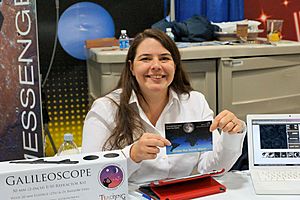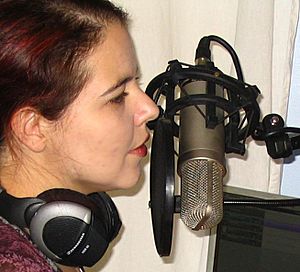Pamela L. Gay facts for kids
Quick facts for kids
Pamela L. Gay
|
|
|---|---|
Pamela Gay at Skepticon Australia in 2018
|
|
| Born | December 12, 1973 California, United States
|
| Education | Michigan State University (BS) University of Texas at Austin (PhD) |
| Occupation | Astronomy |
| Employer | Planetary Science Institute, Edwardsville, Illinois |
| Known for | Astronomy, education, podcasting |
Pamela L. Gay, born on December 12, 1973, is an American astronomer, a teacher, a podcaster, and a writer. She is well-known for her work in astronomy podcasts and for projects that let everyday people help with science, called citizen science. She works as a senior education and communication specialist and a senior scientist at the Planetary Science Institute. Pamela Gay also helps people learn about science by directing a project called CosmoQuest. She speaks about science and how to think like a scientist around the world.
Contents
Early Life and Education
Pamela Gay was born in California, USA. Later, her family moved to Westford, Massachusetts. She went to Westford Academy for high school. She earned her first degree in astrophysics from Michigan State University in 1996. Then, she got her PhD in astronomy from the University of Texas at Austin in 2002.
Before working at the Planetary Science Institute, Pamela Gay was the director of technology and citizen science for the Astronomical Society of the Pacific. She also worked as a research professor at Southern Illinois University Edwardsville. She was part of the board of directors for the American Association of Variable Star Observers.
How She Helps Science
Pamela Gay helped lead the United States' efforts for the International Year of Astronomy in 2009. This was a worldwide event to celebrate astronomy and help more people learn about it.
Her research often focuses on how to get people excited about science using media and citizen science projects. She also studies how to show and understand large amounts of astronomy data. She works with both professional and amateur astronomers around the world to study special stars called RR Lyrae stars.
Pamela Gay has also studied how podcasts can help people learn about astronomy. She looked at how the Slacker Astronomy podcast helped teach science.
CosmoQuest: You Can Be a Scientist!
Pamela Gay is the director of a cool citizen science project called CosmoQuest. This project works with NASA missions like Dawn, the Lunar Reconnaissance Orbiter (LRO), and MESSENGER. CosmoQuest creates projects where people can help map the surfaces of planets and moons. They also explore the atmospheres of planets and other small objects in our solar system.
The project lets users help identify and map features on surfaces using pictures from NASA missions. For example, counting craters is very important for scientists, but it's hard for computers to do. People can look at images, find craters, and mark them. Their work is then combined with what other citizen scientists find. Some CosmoQuest projects have included Planet Mappers, Moon Mappers, and Asteroid Mappers. There's even a mobile app for the Moon Mappers project called Moon Mappers Crater Decay.
CosmoQuest also offers workshops for teachers and online astronomy courses.
Sharing Science with Everyone
Pamela Gay loves to share astronomy with everyone. She believes that people should work together to create a community of science. She often takes part in the Virtual Star Party, which is a weekly video show. In this show, professional and amateur astronomers talk about space. Google even made a documentary about it in 2012.
Pamela Gay also helps people learn to think critically about science. She spoke at a big meeting called The Amaz!ng Meeting (TAM) in Las Vegas, Nevada in 2011. There, she was on a panel with famous scientists like Bill Nye and Neil deGrasse Tyson. They talked about the future of space exploration.
At TAM 2012, Pamela Gay encouraged people to take positive action. She wanted them to help solve problems like unfair treatment and to work together on science projects. She has also written about her own experiences with gender bias in science.
Pamela Gay has spoken about astronomy at DragonCon in Atlanta, Georgia. She talked about topics like multiverses and the "Limits of Skepticism" in panel discussions.
Podcasting: Astronomy for Your Ears
Pamela Gay is a co-host of the Astronomy Cast podcast with Fraser Cain. This educational show started in September 2006. It covers many topics, including our solar system, black holes, and common misunderstandings about astronomy. The show aims to explain not only what we know but also how we know it.
Pamela Gay was also one of the people who started Slacker Astronomy. She was a voice on that show from 2005 to 2006.
In 2008, Pamela Gay helped come up with ideas for new media programs for the International Year of Astronomy (IYA) in 2009. This led to the 365 Days Of Astronomy podcast. The plan was to release one episode every day for the entire year of 2009. One of the main goals of the IYA was to make astronomy easy and cheap for everyone. For example, special telescopes called Galileoscopes were sold for only $10 each. Pamela Gay said, "You can actually see the rings of Saturn" with them. She also worked to get people involved online who might not want to go outside.
Since 2009, Pamela Gay has been a judge for the Parsec Awards. These awards celebrate great science fiction podcasts.
Awards and Honors
- American Humanist Association's 2019 Isaac Asimov Science Award
- Sigma Xi Researcher of the Year Award for Southern Illinois University Edwardsville – 2012
- Outstanding Science Educator of the Year Award, The Academy of Science – St. Louis – 2012
- "Best Infotainment" Parsec Award for Astronomy Cast – Finalist 2007 – 2009, 2011 – 2012
- "Best Infotainment" Parsec Award for 365 Days of Astronomy – Finalist 2010 – 2012, Winner 2009
Personal Life
Pamela Gay lives in southern Illinois with her husband. She also loves horse riding.
She has shared that an early inspiration came from living in California. She remembers seeing the trails left by the space shuttle as it landed at Edwards Air Force Base. She also watched TV images from the Voyager missions passing Jupiter in 1979 when she was five years old.
When she was in second grade, Pamela Gay moved with her parents to Westford, Massachusetts. She describes it as a "fairly small town" that was good because it had dark skies for stargazing. The town is also home to Haystack Observatory, where she worked during her last year of high school.
Media Appearances
Pamela Gay has appeared as herself in several TV documentary series.
| Year | Program | Episode(s) | Notes |
|---|---|---|---|
| 2015 | The Universe | Episode #9.01 – "Omens of Doom" | TV series documentary |
| 2013 | Top Secrets | Episode #1.02 – "Doomsday" | TV series documentary |
| 2012 | The Universe | Episode #6.11 – "Deep Freeze" | TV series documentary |
| 2009 | The Universe | Episode #4.11 – "Science Fiction, Science Fact" | TV series documentary |
| 2009 | The Universe | Episode #4.08 – "Space Wars" | TV series documentary |
See also
 In Spanish: Pamela L. Gay para niños
In Spanish: Pamela L. Gay para niños



